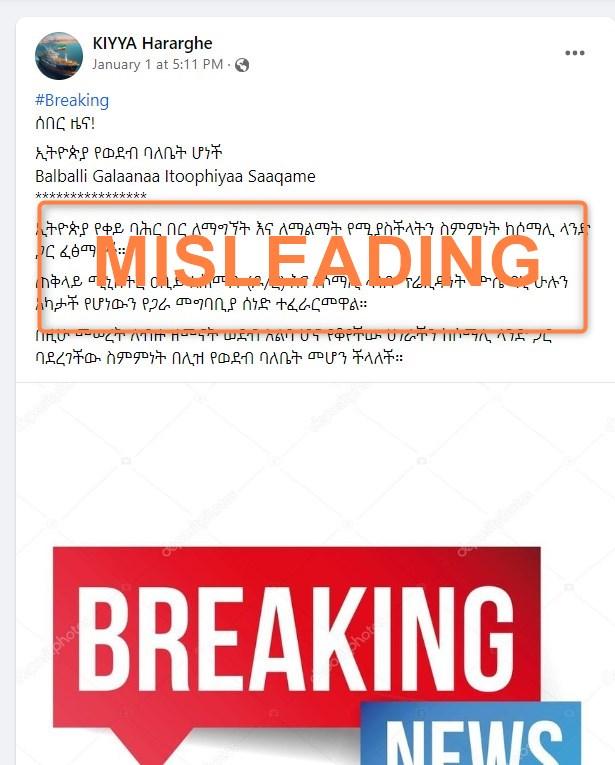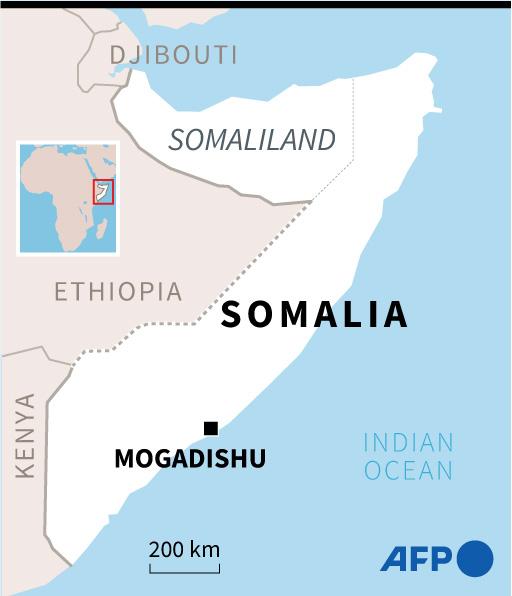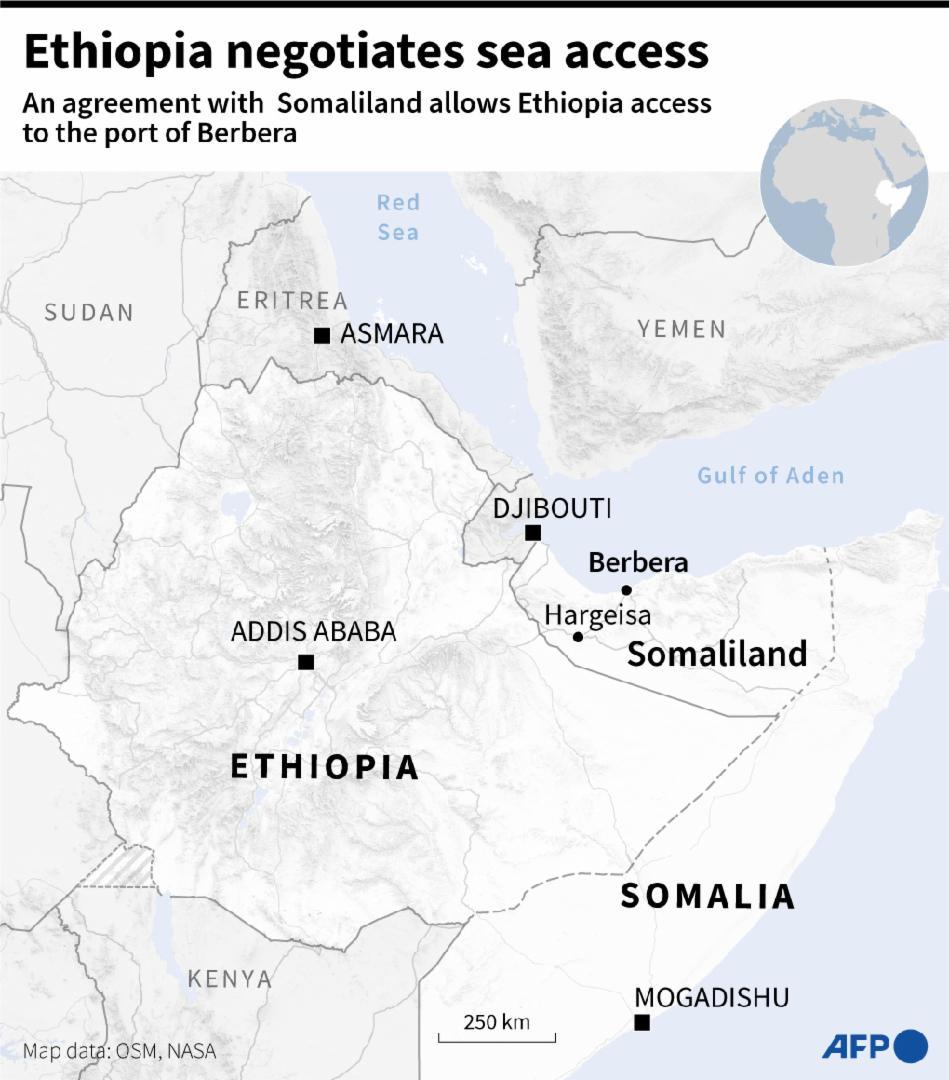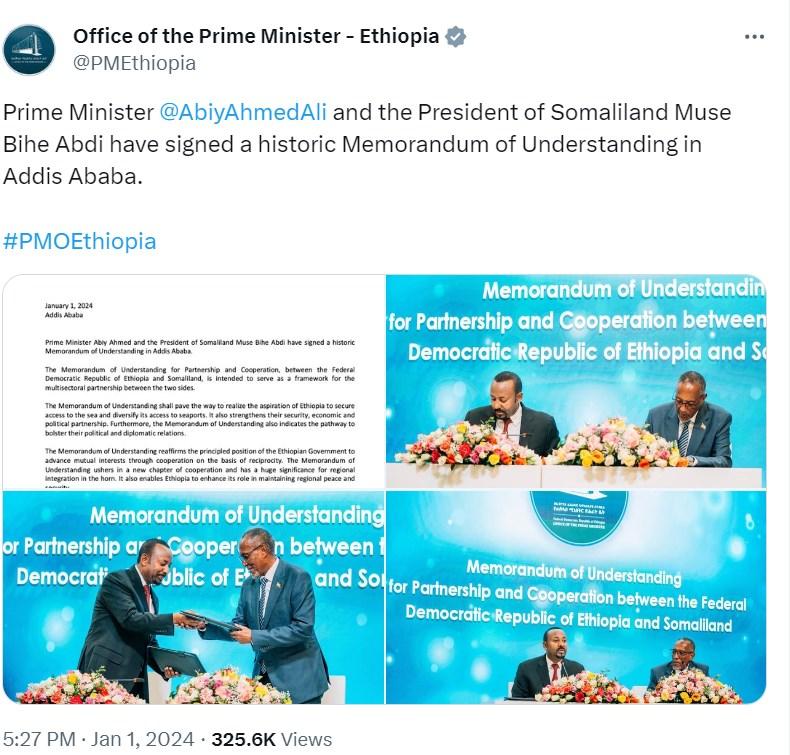
Lease deal between Ethiopia and Somaliland over port access taken out of context
- This article is more than two years old.
- Published on January 4, 2024 at 15:41
- 3 min read
- By Tolera FIKRU GEMTA, AFP Ethiopia
On January 1, 2024, Ethiopia signed an agreement with Somaliland – a breakaway region of Somalia – to use the territory’s port of Berbera. A post shared on Facebook on the same day claimed the deal gave Ethiopia ownership of the port. However, this is misleading: although the agreement guarantees landlocked Ethiopia leased access to the Red Sea port of Berbera, it does not constitute ownership.
The Amharic post has been shared more than 140 times and starts as a “Breaking news!” alert.
“Ethiopia has become the owner of a port,” reads the headline that follows.
The post continues: “Ethiopia has signed an agreement with Somaliland to access and develop the coast of the Red Sea. Prime Minister Abiy Ahmed (Dr.) and Somaliland President Muse Bahi signed an all-inclusive memorandum of understanding.”

“Accordingly, our country, which has been landlocked for many years, has become the owner of a port through an agreement with Somaliland,” reads the rest of the text.
A similar Facebook post in Afaan Oromoo and Amharic reads, “Congratulations! Ethiopia has become the owner of a port”.
Ethiopia, Somalia and Somaliland
Somaliland broke away from Somalia in 1991 and became a self-declared republic in 2001 following a referendum (archived here).
However, Somaliland’s statehood has not been recognised by Somalia, the United Nations or the African Union.
Both Somalia and Somaliland share a border with landlocked Ethiopia and have ports on the Red Sea.

However, the claim that Ethiopia now owns Somaliland’s port is misleading.
Port access agreement
The Ethiopian government has been pressing neighbouring countries for negotiated access to the Red Sea (archived here).
On January 1, 2024, Prime Minister Abiy Ahmed signed (archived here) an agreement with Somaliland’s leader Muse Bihi Abdi in Addis Ababa allowing Ethiopia to use the breakaway territory’s port in Berbera.

Abiy’s office released a statement (archived here) saying that “the Memorandum of Understanding shall pave the way to realise the aspiration of Ethiopia to secure access to the sea”.

According to Ethiopia’s National Security Adviser Redwan Hussien, the MoU allows Ethiopia to establish commercial maritime operations in the region by leasing a military base in Berbera on the southern coast of the Gulf of Aden, at the gateway to the Red Sea and further north to the Suez canal.

Neither Abiy’s office nor Redwan described the agreement as one of ownership.
This was confirmed to AFP Fact Check by government spokesman Legesse Tulu.
“The MoU is all about leasing a maritime base,” he said, without providing further details.
Somaliland's foreign ministry also confirmed through a press release (archived here) issued on January 3, 2024, that the port access agreement was for a definite period.
“In exchange for 20 kilometre sea access for the Ethiopian naval forces, leased for a period of 50 years, Ethiopia will formally recognise the Republic of Somaliland, setting a precedent as the first nation to extend international recognition to our country,” the statement quoted Somaliland’s president as saying.
The arrangement has angered Somalia, whose government rejected the bilateral deal and warned that it was in violation of its sovereignty. As a result, Somalia recalled its ambassador to Addis Ababa (archived here).
Copyright © AFP 2017-2026. Any commercial use of this content requires a subscription. Click here to find out more.
Is there content that you would like AFP to fact-check? Get in touch.
Contact us
